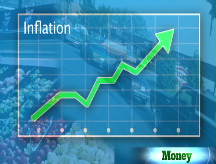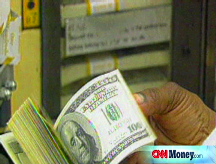Listen up! The bond markets are talking
The recent rally in U.S. Treasurys is a sign that the decline in oil prices is probably for real. Unfortunately, it's also an indication of more economic weakness ahead.

 |
| Bond yields have fallen in the past month as oil prices have declined and credit crunch fears returned. But experts don't expect yields to return to their March lows. |
NEW YORK (CNNMoney.com) -- Bond prices have rallied lately. And that's both a good thing and bad thing.
The encouraging news is that the recent bump in bond prices and resulting dip in yields is probably a sign that the worst of the oil-fueled (pun intended) inflation fears are over.
The yield on the benchmark U.S. 10-year Treasury is now hovering near 3.8% - down from about 4.15% just a month ago.
Higher bond prices and lower yields are usually a sign that pricing pressures are waning since inflation eats into the value of fixed-income investments.
And with oil prices falling in the past few weeks and the dollar strengthening, bond investors have had reason to cheer.
"One thing helping Treasurys out is the performance of the dollar," said Steve Van Order, chief fixed income strategist with Calvert Funds in Bethesda, Md.
"People aren't looking at the rearview mirror on inflation or the yield on the 10- year would be well above 4% right now. The inflation concern has moved away a bit," Van Order added.
But, of course, behind the bond rally lurks a big dose of gloomy news: The United States may remain in an economic funk for some time and the rest of the world is starting to slow down as well.
"Inflation pressures may have eased slightly. But more important is the outlook for the economy," notes John Canavan, an analyst with Stone & McCarthy Research Associates, a fixed-income and economic research firm. "It will remain weak. The situation in housing will pressure economy well into next year."
With fears of an imminent government takeover of beleaguered mortgage giants Fannie Mae (FNM, Fortune 500) and Freddie Mac (FRE, Fortune 500) pushing down both stocks to fresh new 52-week lows Wednesday morning, there is ample reason to believe that bond yields may fall even lower.
With money fleeing once-hot commodities, Treasurys may benefit from the proverbial "flight to quality" - the notion that U.S. government debt, despite the nation's economic woes, are one of the least risky bets an investor can make in turbulent times.
"In this environment, Treasurys could do well for people looking for safety," Van Order said. "If you're taking money out of the commodities market and looking for a place to put it, Treasurys would be it."
So what's this all mean? As long as the 10-year yield remains this low, the Fed is likely to keep holding interest rates steady as it has for the past two meetings. If inflation fears continue to wane, the central bank probably won't want to upset the fixed-income markets.
And that, unfortunately, means more of the same for the economy for the foreseeable future.
But the one bright spot, if you could call it that, is that the markets may finally be nearing a point where most of the bad economic and financial news - even what now seems to be an almost inevitable bailout of Fannie and Freddie - is priced into bonds.
To that end, Canavan predicts that 10-year yields could fall a little further - to about 3.6% - if the credit crisis deepens and the economy continues to weaken.
However, he does not think that long-term yields will fall as low as 3.28%, the level they hit back in March just before the Federal Reserve stepped in and engineered JPMorgan Chase's (JPM, Fortune 500) fire sale "takeunder" of investment bank Bear Stearns.
"There is the potential for further downside in yields. But most of the fears are already priced in even though the troubles in financial sector will remain," Canavan said. "There will be more write downs but they are no longer the surprise they once were."
Van Order agrees. "There has been a renewal of uncertainty - which therefore leads to fear regarding financials in general. That said, the level of fear is less than it's been before," he said. ![]()




